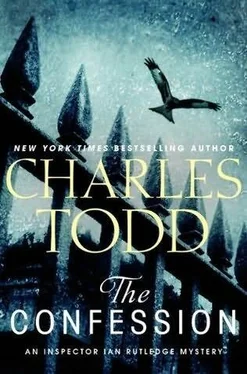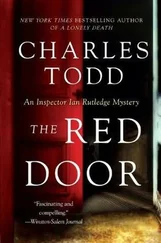Charles Todd - The Confession
Здесь есть возможность читать онлайн «Charles Todd - The Confession» весь текст электронной книги совершенно бесплатно (целиком полную версию без сокращений). В некоторых случаях можно слушать аудио, скачать через торрент в формате fb2 и присутствует краткое содержание. Жанр: Полицейский детектив, на английском языке. Описание произведения, (предисловие) а так же отзывы посетителей доступны на портале библиотеки ЛибКат.
- Название:The Confession
- Автор:
- Жанр:
- Год:неизвестен
- ISBN:нет данных
- Рейтинг книги:5 / 5. Голосов: 1
-
Избранное:Добавить в избранное
- Отзывы:
-
Ваша оценка:
- 100
- 1
- 2
- 3
- 4
- 5
The Confession: краткое содержание, описание и аннотация
Предлагаем к чтению аннотацию, описание, краткое содержание или предисловие (зависит от того, что написал сам автор книги «The Confession»). Если вы не нашли необходимую информацию о книге — напишите в комментариях, мы постараемся отыскать её.
The Confession — читать онлайн бесплатно полную книгу (весь текст) целиком
Ниже представлен текст книги, разбитый по страницам. Система сохранения места последней прочитанной страницы, позволяет с удобством читать онлайн бесплатно книгу «The Confession», без необходимости каждый раз заново искать на чём Вы остановились. Поставьте закладку, и сможете в любой момент перейти на страницу, на которой закончили чтение.
Интервал:
Закладка:
In light of what he’d been reading, Rutledge suddenly realized that the manuscript explained the missing luggage.
Whoever had come to see Willet at the lodging house must have known-or guessed-what Willet was carrying to France with him. The finished work. The man had to die so that he couldn’t re-create what he’d written, and the manuscript couldn’t survive him to be sent to Paris posthumously.
Was that what had happened?
Gathering up the pages he’d read, Rutledge set them carefully back into the box they’d come from, and rummaging in what had been his father’s desk, he found a roll of twine with which to bind it shut. That done, he carried the two boxes into the attic and left them there until he could decide whether they were evidence or Willet’s personal property, to be handed over to Cynthia Farraday as the man had wished.
Back in his room, he lay on the bed, staring at the ceiling.
Most of the facts had been there, and he’d failed to see them. Still, the few that had been missing made a whole of the story, and without them he had been unable to understand what was wrong with the village of Furnham-on-Hawking.
It was a fisherman named Jessup who had tossed the logbook overboard so that no one else would realize that this was a plague ship. The last survivor on board had written there, All dead but me. I still don’t know who brought the plague aboard. I do fear we stayed too long in Rotterdam. I watched them die, and now I find I can’t face such an end alone and without comfort. If you find this, whoever you are, know that I chose self-destruction. I pray God will forgive me. But if I’m damned for it, then the devil must look for me in the sea.
So many more dying in Furnham all because of one man’s greed. But it was what the villagers did next that was unthinkable.
The rector had gathered all the plague victims in the tiny church and was nursing them there, setting the dead outside on the porch, trying to contain the sickness as best he could, dependent on food and fresh water brought to him by villagers and left in the churchyard. The man had worked day and night to save as many souls as possible.
And outside, by the harbor, the man who had destroyed the logbook harangued the remaining people of the village, telling them that the only way to stop the spread of the plague was to burn it out. In the end, they collected wood and torches, blocked the exits from the church, and set it afire. The rector and the victims inside had screamed for mercy, but there was none. The church burned to the ground.
No one knew whether it was God or the devil who answered their prayers as the church burned, prayers that the plague would end and everyone else would be spared.
There were no more victims.
But Jessup, watching his own wife burn alive, hanged himself within a year on a tree near the harbor, in plain sight of the villagers. A pact was made then never again to speak of what had happened. It was Jessup’s defiant son who had renamed the inn for the doomed ship. No one had dared to change it again.
Chapter 22
After breakfast with his sister, Rutledge went to the Yard.
She had commented as she poured his tea that he looked tired and asked if he’d slept well.
He had lain awake most of the night for fear he would have a nightmare and start up screaming, frightening Frances. But he smiled and said, “Chief Superintendent Bowles has had a heart attack. The Yard is tense, waiting to see if he’ll return when he’s stronger or if we’ll have a new Chief Superintendent. We all feel it.”
“I’m sure that’s true. You and he never got on, did you? Well, I hope the new man, if there is going to be one, is more sympathetic.”
When he walked into his office there was a message on his desk from Gibson, and attached to it was a cutting of the request for information from the Times.
Rutledge read it again, then set it aside. He wasn’t sure now what sort of response there would be. He doubted that anyone in Furnham read the Times, and he would have to take a copy to them. With what he knew now, he hoped he could finally clear up the murder of Ben Willet. He had a motive now and clear suspects. As for the attack on Russell, it would most certainly no longer be an inquiry for the Yard. It would be turned over to the Tilbury police, now that the Major had survived. The other deaths-if there were others-would have to remain unsolved.
Hamish said, “It willna’ be resolved.”
True enough, Rutledge thought. Tilbury had never solved the disappearance of Mrs. Russell, just as Colchester had never solved the murders of Justin Fowler’s parents.
Still, even though he couldn’t quarrel with the evidence before him, he was not satisfied.
Another question was what Cynthia Farraday would do when Willet’s new novel failed to arrive, even though he’d promised her a copy. Would she raise the matter with his Paris publishers?
He had no more than formulated the thought when there was a tap at his door and Constable Henry stuck his head in.
“A Miss Farraday to see you, sir. And she appears to be very upset.”
He wasn’t surprised. He hadn’t told her about the fabricated article, just in case Fowler tried to contact her.
She came in, her face flushed with anger, and he thought too that she had been crying.
“You didn’t have the courtesy to come and tell me,” she said at once. “I was left to read the news in the Times. I would have gone to him, I would have been with him when he died.”
“I’m sorry. There has been no opportunity to tell you.”
“Did he suffer? Who shot him? When? Where? I don’t know anything!”
He had been standing when she came in, and he offered her a chair. “Sit down. Let me tell you what I know.”
She did as he asked, but her eyes were still blazing with her fury, and he felt a surge of regret for what he was about to do.
He told her how he had finally learned that Russell had gone to Essex. “And I left the church before they could find me there listening. I went on to River’s Edge and waited for him to come. But he didn’t, and I believed that Morrison had relented and let him spend the night at the Rectory. The next morning I spoke to Nancy Brothers, who told me he hadn’t come back to the church ruins, and I went myself to be sure. From there I drove to the Rectory. But neither Morrison nor Russell came to the door. I was just turning toward River’s Edge when I saw Morrison coming from that direction. He’d been looking for Russell as well, and together we went back to the house to search more carefully.”
He glossed over discovering what he’d thought was Russell’s dead body and the difficulty of carrying the wounded man to the motorcar. He said only, “We found him on one of the marsh tracks. We managed to get him to a London hospital, Morrison and I. I don’t believe he ever regained consciousness.”
“And you don’t know who shot him-or why?”
“We’ve had very little luck. That’s why we asked the public for assistance.”
“And you think anyone in Furnham has even seen this article?” She shook her head in disbelief. “First Ben. And now Wyatt.” She angrily brushed away a tear. “And so far you’ve done nothing to stop it. Nothing at all. Scotland Yard, for heaven’s sake! And no better than that poor drunken constable in Furnham. Do you realize that I’m alone now? They’re all gone. Aunt Elizabeth. Justin. Ben. My parents. It’s a frightening feeling, I can tell you. And you didn’t have the courage or the decency to come to me and break the news yourself.”
She began to cry then. He handed her his handkerchief as she fumbled for her own. She rejected it, as if to take it would be to forgive him.
“I can only say how sorry I am.”
Читать дальшеИнтервал:
Закладка:
Похожие книги на «The Confession»
Представляем Вашему вниманию похожие книги на «The Confession» списком для выбора. Мы отобрали схожую по названию и смыслу литературу в надежде предоставить читателям больше вариантов отыскать новые, интересные, ещё непрочитанные произведения.
Обсуждение, отзывы о книге «The Confession» и просто собственные мнения читателей. Оставьте ваши комментарии, напишите, что Вы думаете о произведении, его смысле или главных героях. Укажите что конкретно понравилось, а что нет, и почему Вы так считаете.












